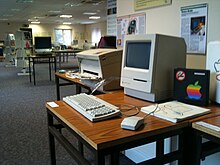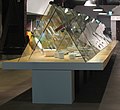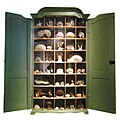Portal:Museums
The Museums Portal
A museum (/mjuːˈziːəm/ mew-ZEE-əm) is an institution dedicated to displaying and/or preserving culturally significant objects. Many museums have exhibitions of these objects on public display, and some have private collections that are used by researchers and specialists. Compared to a library, a museum hosts a much wider range of objects and usually focus around a specific theme such as the arts, science, natural history, local history, and other topics. Public museums that host exhibitions and interactive demonstrations are often considered to be tourist attractions, and many museums attract large numbers of visitors from outside their host country, with the most visited museums in the world regularly attracting millions of visitors annually.
Since the establishment of the earliest known museum in ancient times, museums have been associated with academia and the preservation of rare items. Museums originated as private collections of interesting items, and not until much later did the emphasis on educating the public take root. (Full article...)
Selected museum

The Natural History Museum in London is a museum that exhibits a vast range of specimens from various segments of natural history. It is one of three major museums on Exhibition Road in South Kensington, the others being the Science Museum and the Victoria and Albert Museum. The Natural History Museum's main frontage, however, is on Cromwell Road.
The museum is home to life and earth science specimens comprising some 80 million items within five main collections: botany, entomology, mineralogy, palaeontology and zoology. The museum is a centre of research specialising in taxonomy, identification and conservation. Given the age of the institution, many of the collections have great historical as well as scientific value, such as specimens collected by Charles Darwin. The museum is particularly famous for its exhibition of dinosaur skeletons and ornate architecture—sometimes dubbed a cathedral of nature—both exemplified by the large Diplodocus cast that dominated the vaulted central hall before it was replaced in 2017 with the skeleton of a blue whale hanging from the ceiling. The Natural History Museum Library contains an extensive collection of books, journals, manuscripts, and artwork linked to the work and research of the scientific departments; access to the library is by appointment only. The museum is recognised as the pre-eminent centre of natural history and research of related fields in the world.
Although commonly referred to as the Natural History Museum, it was officially known as British Museum (Natural History) until 1992, despite legal separation from the British Museum itself in 1963. Originating from collections within the British Museum, the landmark Alfred Waterhouse building was built and opened by 1881 and later incorporated the Geological Museum. The Darwin Centre is a more recent addition, partly designed as a modern facility for storing the valuable collections.
Like other publicly funded national museums in the United Kingdom, the Natural History Museum does not charge an admission fee. The museum is an exempt charity and a non-departmental public body sponsored by the Department for Culture, Media and Sport. The Princess of Wales is a patron of the museum. There are approximately 850 staff at the museum. The two largest strategic groups are the Public Engagement Group and Science Group. (Full article...)
Selected interior image
Selected general article

A collection manager ensures the proper care and preservation of objects within cultural institutions such as museums, libraries, and archives. Collection managers, along with registrars, curators, and conservators, play an important role in collections care. Collection Managers and Registrars are two distinct collection roles that are often combined into one within small to mid-size cultural institutions. Collection Managers can be found in large museums and those with a history and natural history focus whose diverse collections require experienced assessment to properly sort, catalog, and store artifacts. A collection manager may oversee the registrar, archivist, curator, photographer, or other collection professionals, and may assume the responsibilities of these roles in their absence within an organization. (Full article...)
Did you know...
- ... that after one of Piet Mondrian's paintings (shown) was discovered to have been hanging upside down for decades, the museum left it as is?
- ... that the Museum of French Art once exhibited Napoleon's penis?
- ... that Hasanpaşa Gasworks escaped its demolition through the resistance of local residents, became a festival venue for a time and was finally transformed into a museum after redevelopment?
- ... that the Museum of Contemporary Art Australia is the only contemporary art museum in the country with a permanent collection?
- ... that the Richard Childress Racing Museum is located in the former team workshop in which Richard Childress Racing won six NASCAR Cup Series championships and 58 races?
- ... that King Mohammed VI of Morocco donated part of his royal collection to the new National Jewellery Museum?
Get involved
For editor resources and to collaborate with other editors on improving Wikipedia's Museums-related articles, see WikiProject Museums.
Selected exterior image
Selected type of museum

A computer museum is devoted to the study of historic computer hardware and software, where a "museum" is a "permanent institution in the service of society and of its development, open to the public, which acquires, conserves, researches, communicates, and exhibits the tangible and intangible heritage of humanity and its environment, for the purposes of education, study, and enjoyment", as defined by the International Council of Museums.
Some computer museums exist within larger institutions, such as the Science Museum in London, United Kingdom; and the Deutsches Museum in Munich, Germany. Others are dedicated specifically to computing, such as:
- the Computer History Museum in Mountain View, California, United States.
- the American Computer & Robotics Museum in Bozeman, Montana, United States.
- The National Museum of Computing at Bletchley Park, United Kingdom.
- The Centre for Computing History in Cambridge, United Kingdom
- the Nexon Computer Museum in Jeju Province. South Korea. (Full article...)
Subcategories
Subtopics
Lists
- Museums
- Most visited museums (by region)
- Art museums: most visited, largest
Types
- Art museum
- Agricultural museum
- Archaeology museum
- Architecture museum
- Artillery museum
- Aviation museum
- Biographical museum
- Cabinet of curiosities
- Ceramics museum
- Children's museum
- Community museum
- Computer museum
- Design museum
- Dime museum
- Ecomuseum
- Economuseum
- Ethnographic village
- Farm museum
- Fashion museum
- Folk museum
- Food museum
- Green museum
- Hair museum
- Hall of Memory
- Heritage centre
- Historic house museum
- Human rights museum
- Imaginarium
- Interpretation centre
- Jewish museum
- Lapidarium
- Lighthouse museum
- Living museum
- Local museum
- Maritime museum
- Migration museum
- Mobile museum
- Museum ship
- National history museum
- Natural history museum
- Open-air museum
- Palace museum
- Postal museum
- Prefectural museum
- Print room
- Private museum
- Regimental museum
- Schatzkammer
- Science fiction libraries and museums
- Science museum
- Sex museum
- Sculpture garden
- Technology museum
- Textile museum
- Torture museum
- Toy museum
- Transport museum (list)
- University museum
- Virtual museum
- Wax museum
- Writer's home
Related
Associated Wikimedia
The following Wikimedia Foundation sister projects provide more on this subject:
-
Commons
Free media repository -
Wikibooks
Free textbooks and manuals -
Wikidata
Free knowledge base -
Wikinews
Free-content news -
Wikiquote
Collection of quotations -
Wikisource
Free-content library -
Wikiversity
Free learning tools -
Wiktionary
Dictionary and thesaurus






































































